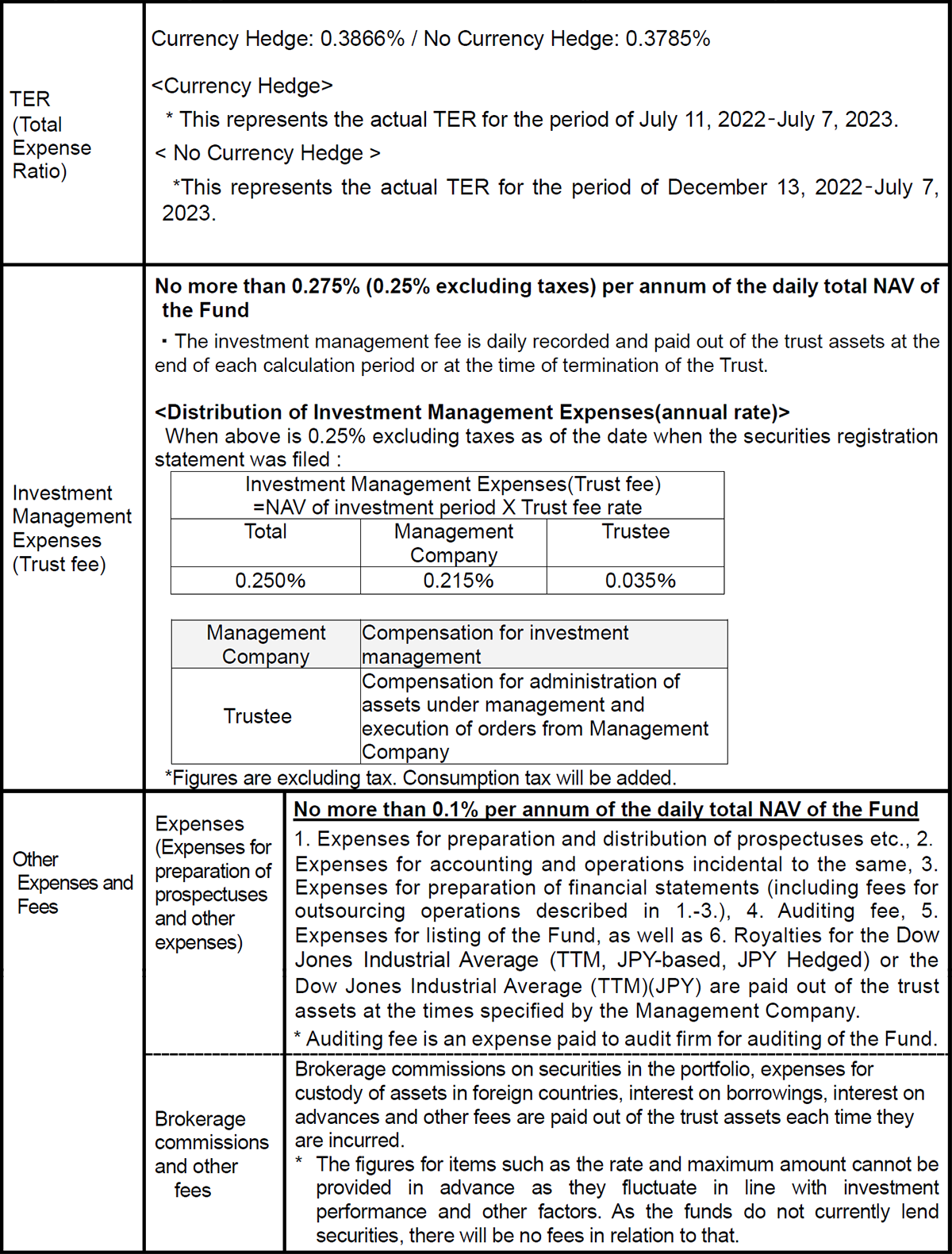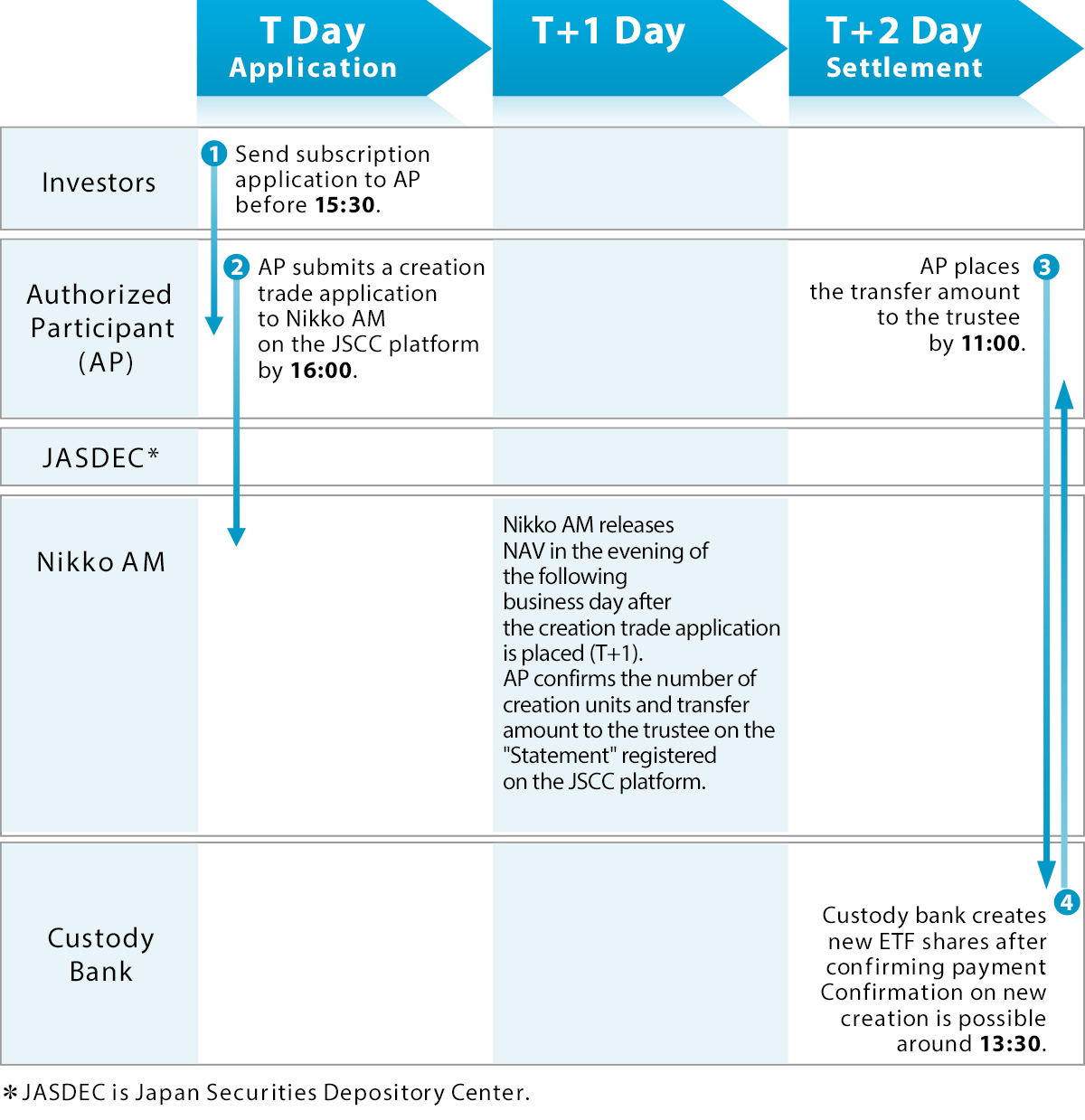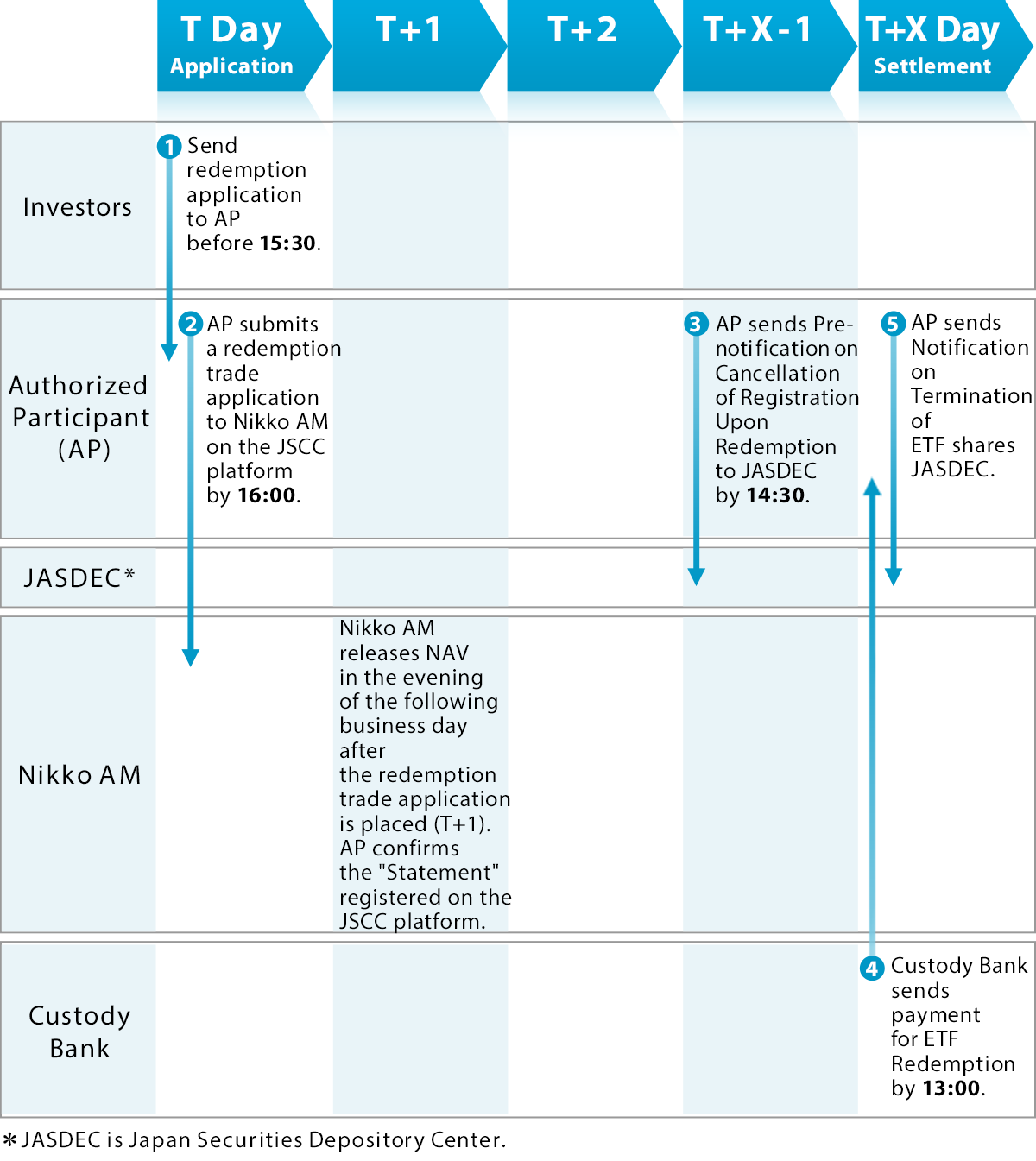On September 1, 2025, Nikko Asset Management Co., Ltd. will change its name to Amova Asset Management Co., Ltd.
This Fund seeks the net asset value per unit to track the performance of the Dow Jones Industrial Average (TTM, JPY-based, JPY Hedged) by mainly investing in the mother fund.
Key information
| Name: | Listed Index Fund US Equity (Dow Average) Currency Hedge | |
| Code: | 2562 |
Net Asset Value and Performance
Structure of the Fund

| Fund Name | Listed Index Fund US Equity (Dow Average) Currency Hedge Open-end/Overseas/Equities/ETF/Index-type |
| Listed Exchange | Tokyo Stock Exchange |
| Issue Code | 2562 |
| Targeted Investments | This Fund seeks to achieve net asset worth per unit that closely correlates with the movement of the Dow Jones Industrial Average (TTM, JPY-based, JPY Hedged) by mainly investing in the mother fund. |
| Date Listed | March 18, 2020 (launched on March 13, 2020) |
| Exchange Trading Unit | 1 unit |
| Trust period | Unlimited |
| Computation Period | From 9 January to 8 July, from 9 July to 8 January of the following year |
| Closing Date | January 8 and July 8 each year |
| Dividends | As a general rule, the full amount of dividends and other income arising from the trust assets is distributed after deduction of expenses. *There is no guarantee on the payment or the amount of dividend. |
Fund Expenses
■Expenses to be borne directly by investors
| Subscription Fee | Independently set by Distributors *Please contact your Distributor for further information. *Subscription Fee is compensation for explanation and information providing about the Fund or investment environment, and is also including expense of clerical processing of the subscription. |
| Exchange Fee | Independently set by Distributors *Please contact your Distributor for further information. *Exchange Fee is compensation for clerical processing of the exchange. |
| Amount to be Retained in Trust Assets | None. |
■Costs paid indirectly by the customer for the trust assets (paid from the fund)
| TER (Total Expense Ratio) |
Currency Hedge: 0.39% / No Currency Hedge: 0.39% Please refer to the prospectus for details. |

The total amount of expenses of the Fund to be borne by investors varies according to holding length and investment status, and thus cannot be shown.
Major Investment Restrictions
|
Trustee Companies
|
The Dow Jones Industrial Average is a price-weighted stock index composed of 30 excellent companies representing main sectors (excluding Transportation and Utilities) among stocks listed on financial instruments exchanges in the United States. In selecting components, company’s sustainable growth and investor’s high interest, etc. are considered. Dow Jones Industrial Average (TTM, JPY-based, JPY Hedged) is the result of JPY hedging of local currency-based index and converted into JPY.

Further Information
Japan Exchange Group (JPX)
Japan Exchange Group publishes summaries and lists of the ETFs, as well as other valuable information on their website.
S&P Global
- Listed ETF iNav
Please click this link to see the iNAV.
Standard & Poor's
*Link to external sites.
Copyright and Other Rights of the “Dow Jones Industrial Average”
The Dow Jones Industrial Average is a product of S&P Dow Jones Indices LLC or its affiliates ("SPDJI") and has been licensed to Nikko Asset Management Co., Ltd. S&P®, S&P 500®, US 500, The 500, iBoxx®, iTraxx® and CDX® are registered trademarks of S&P Global, Inc. or its affiliates (“S&P”), Dow Jones® is a registered trademark of Dow Jones Trademark Holdings LLC (“Dow Jones”). A license to use these trademarks has been granted to SPDJI and sublicensed to Nikko Asset Management Co., Ltd. for certain purposes. " Listed Index Fund US Equity (Dow Average) Currency Hedge" and " Listed Index Fund US Equity (Dow Average) No Currency Hedge" is neither sponsored, endorsed, sold, nor promoted by SPDJI, Dow Jones, S&P, or their respective affiliates. Neither party makes any representations regarding the justification of investing in such products and accepts no liability for any errors, omissions or interruptions of the Dow Jones Industrial Average.
- 21 Feb 2025 — Earnings Report for Fiscal Year ended Jan 2025
- 21 Aug 2024 — Earnings Report for Fiscal Year ended Jul 2024
- 21 Feb 2024 — Earnings Report for Fiscal Year ended Jan 2024
- 21 Aug 2023 — Earnings Report for Fiscal Year ended Jul 2023
- 21 Feb 2023 — Earnings Report for Fiscal Year ended Jan 2023
- 19 Aug 2022 — Earnings Report for Fiscal Year ended Jul 2022
- 21 Feb 2022 — Earnings Report for Fiscal Year ended Jan 2022
- 20 Aug 2021 — Earnings Report for Fiscal Year ended Jul 2021
- 19 Feb 2021 — Earnings Report for Fiscal Year ended Jan 2021
- 20 Aug 2020 — Earnings Report for Fiscal Year ended Jul 2020 (13 Mar 2020 - 8 Jul 2020)
This Fund can be applied for as a cash creation and a cash redemption at Authorised Participants in addition to the Tokyo Stock Exchange. When applying as a direct addition and exchange, please keep in mind that we cannot accept your application on the following dates:
Authorized Participants
- SMBC Nikko Securities Inc.
- ABN AMRO Clearing Tokyo Co., Ltd.
- Barclays Securities Japan Limited
- BNP Paribas Securities (Japan) Limited
- BofA Securities Japan Co., Ltd.
- Daiwa Securities Co. Ltd.
- Goldman Sachs Japan Co.,Ltd.
- Mitsubishi UFJ Morgan Stanley Securities Co., Ltd.
- Nomura Securities Co.,Ltd.
Daily Creation and redemption are based on ETF's NAV calculated in early evening. Confirm non-tradable days by referring to trading calendar on our official homepage. Basket for creation is continually-updated on our official homepage.
Basically sell/buy at last price of T day's market while FX rate is TTM of one business day after the application (10am on T+1)
The flow chart below is showing the creation/redemption process for Nikko AM ETFs. Please note that transactions cannot be processed for days on which applications are not accepted.
Creation Flow for Cash Creation/Redemption Type ETFs

Redemption Flow for cash Creation/Redemption Type ETFs

Investors are not guaranteed the investment principal that they commit. Investors may incur a loss and the value of their investment principal may fall below par as the result of a decline in market price or NAV. All profits and losses arising from investments in the Fund belong to the investors (beneficiaries). This fund is different from saving deposit.
The Fund invests primarily in stocks. The NAV of the Fund may fall and investors may suffer a loss due to a decline in stock prices or deterioration in the financial conditions and business performance of an equity issuer. Losses may also be incurred due to exchange rate fluctuation when investing in assets denominated in foreign currencies.
Major risks are as follows:
Price Fluctuation Risk
Stock prices fluctuate due to the changes in the information of the company's growth and profitability, and any changes in such information. They also fluctuate as they are affected by economic and political conditions in Japan and abroad. There is a risk that the Fund may incur material losses if unexpected changes occur in stock price movements or liquidity.
Liquidity Risk
There is a risk that the Fund will incur unexpected losses when the market size or trading volumes is small. The purchase and sale prices of securities are influenced by the trading volume, resulting in the inability of the Fund to sell certain stocks in its portfolio at prices that are expected to be realized in light of the prevailing market trend, that a security can sold as appraised, or that the transaction volume is limited regardless of the price levels.
Credit Risk
There is a risk that the Fund will incur material losses in the event of a serious crisis that directly or indirectly affects the business of a corporation in which the Fund invests. The prices of stocks of issuers may substantially decline (possibly to zero) due to fears of default or corporate bankruptcy, which can contribute to decline in the Fund's NAV.
Currency Fluctuation Risk
For foreign currency-denominated assets, in principle, currency hedging is carried out in order to reduce currency fluctuation risk. However, currency fluctuation risk cannot be eliminated completely. When currency hedging is carried out, if the yen interest rate is lower than the interest rate of the currency for which hedging is carried out, a hedge cost equivalent to the difference in interest rates is incurred. Hedge costs for currency hedging may be higher than anticipated depending on currency and interest rate trends.
Major discrepancy factors for the Dow Jones Industrial Average (TTM, JPY-based, JPY Hedged) and NAV
Whereas the Fund seeks to match the NAV volatility with that of the Dow Jones Industrial Average (TTM, JPY-based, JPY Hedged), it does not guarantee movements that are identical to those of the Index for the following reasons:
- The potential investment in selected issues other than Dow Jones Industrial Average (TTM, JPY-based, JPY Hedged), potential market impact from the trading, etc., of individual issues or expenses from trust fees when portfolio adjustments are made due to changes in selected issues on the Dow Jones Industrial Average (TTM, JPY-based, JPY Hedged) or capital transfers, costs borne by the Fund such as trust fees, brokerage commission, and audit costs, etc.
- The timing and amount of payment for the distribution of the Fund will not be completely the same as the distribution from the underlying stocks.
- When derivative transactions such as futures are made, there may be disparity between the price movements of all or some of such transactions and that of the Dow Jones Industrial Average (TTM, JPY-based, JPY Hedged).
Discrepancy between the market prices at which stocks are traded on financial instruments exchanges and the NAV
The Fund is listed on the Tokyo Stock Exchange and the units are traded on that exchange. The market price of the units is affected primarily by the demand for the Fund, its performance, and how attractive it is to investors in comparison with their other investments. It is not possible to predict whether the units will sell in the market above or below the NAV.
*The factors that contribute to fluctuations in the NAV are not limited to those listed above.
Additional Considerations
- This document is meant as promotional material whose purpose is for Nikko Asset Management to provide information about its "Listed Index Fund US Equity (Dow Average) Currency Hedge" and for investors to gain further understanding about the fund.
- The provisions stipulated in Article 37-6 of the Financial Instruments and Exchange Act (the “cooling-off period”) are not applicable to Fund transactions.
- This Fund differs from deposits or insurance policies in that it is not protected by the Deposit Insurance Corporation of Japan or the Policyholders Protection Corporation of Japan. Nor are investment trusts protected by investor protection funds when purchased at banks or other registered financial institutions.
- When the Fund faces big redemption causing short term cash requirement or sudden change in the main trading market condition, there can be temporal decline in the liquidity of holding assets, resulting in the risks that Fund unable to trade securities at the expected market prices or appraised prices, or encounters limitation in trading volume. This may result in the negative influence on NAV, suspension of redemption applications, or delay in making payment of redemption.
- When applying to invest in the Fund, please make the decision to invest carefully after taking the time to read the delivered pre-agreement document and other relevant materials in detail.


